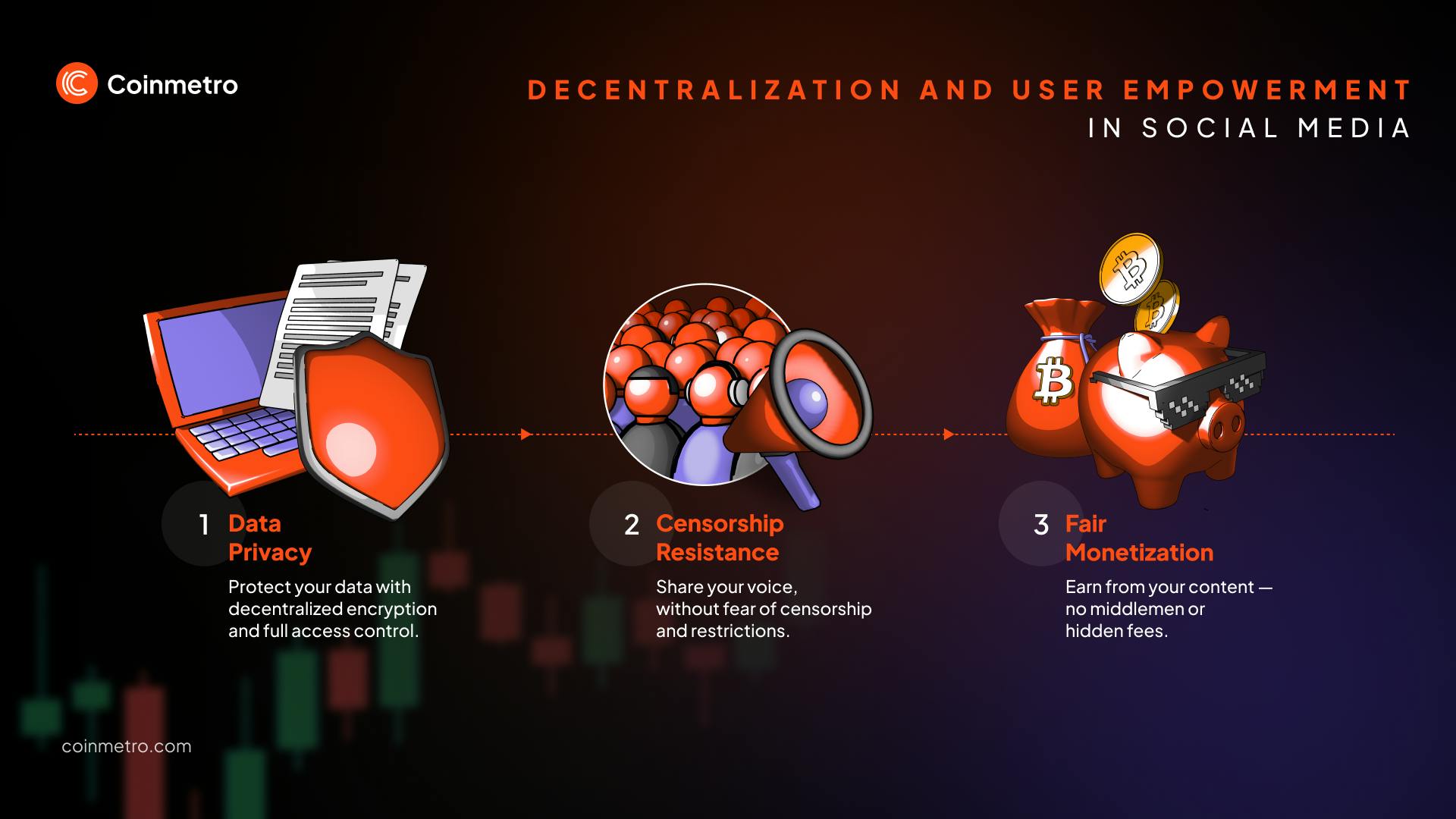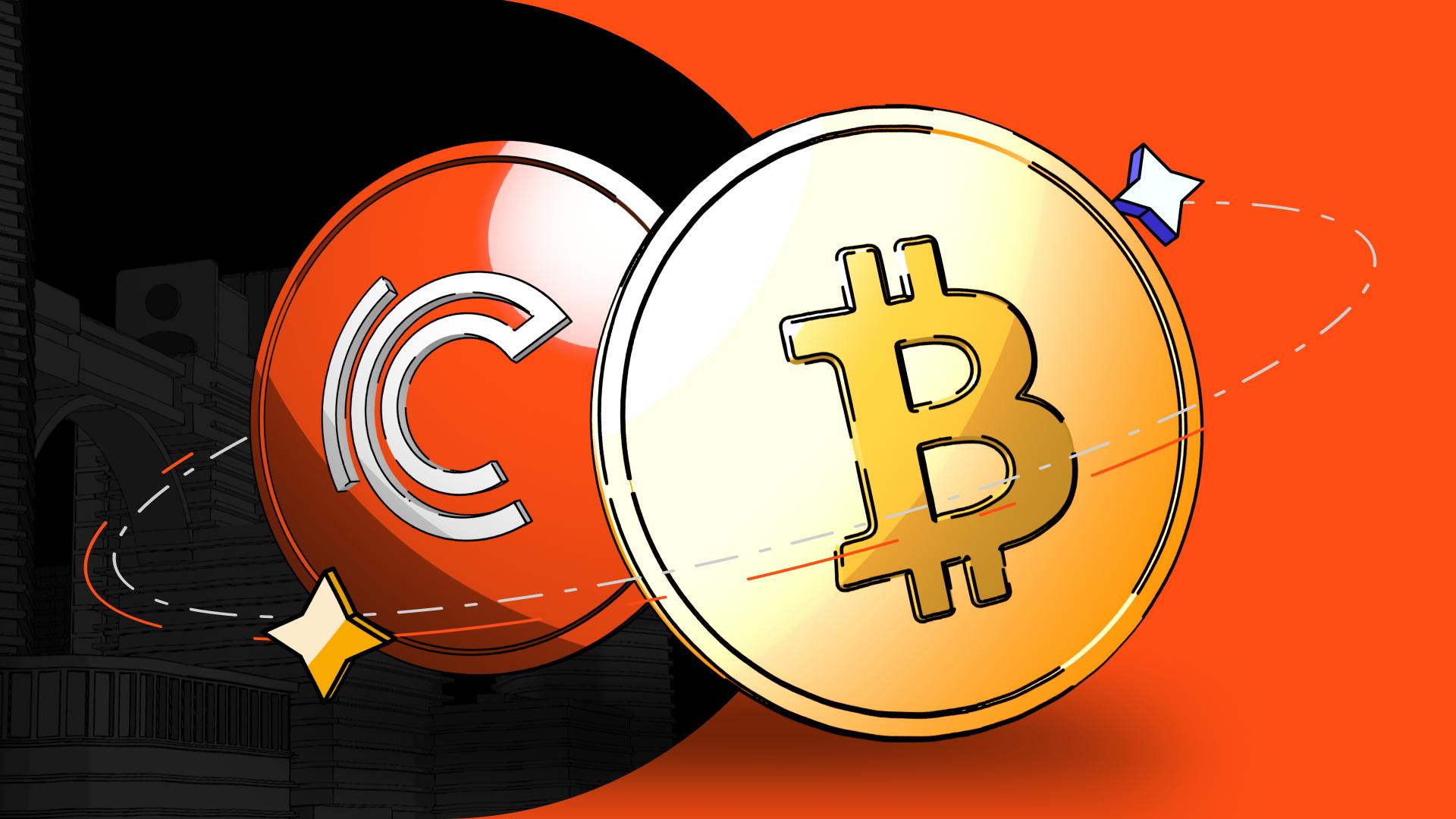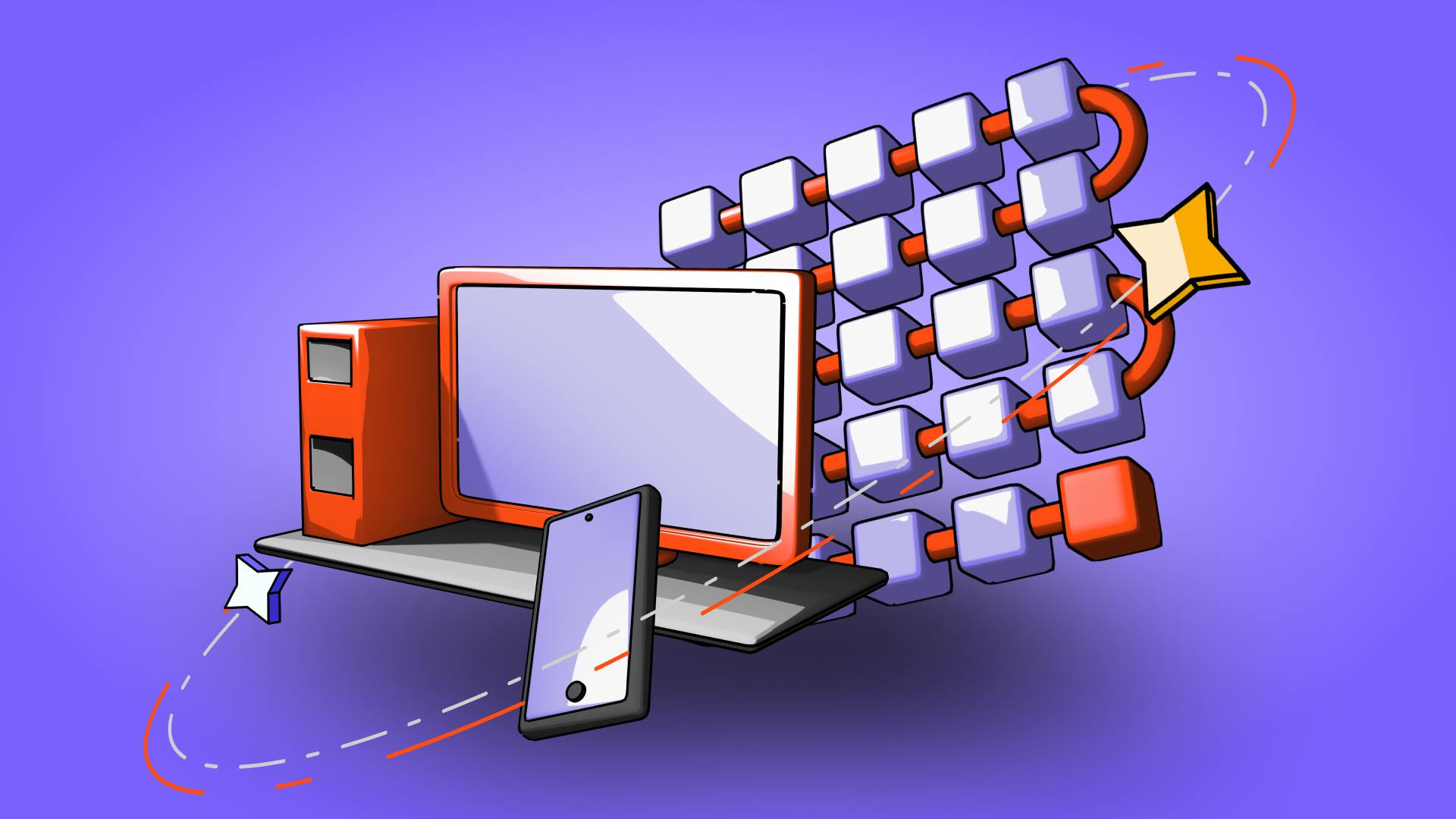How Blockchain Can Transform Social Media Platforms
May 15, 2025

by Coinmetro Editorial Team
May 15, 2025
In 2021, a data leak exposed details from over 530 million Facebook users, underscoring social media’s ongoing privacy and security risks. These platforms often face scrutiny over data breaches, censorship, and limited user control. As these issues grow, blockchain technology offers a promising alternative. Its decentralized structure can enhance privacy, increase user control, and create a safer digital space.
This blog will explore how blockchain can revolutionize social media platforms, touching on the following subjects:
- The current state of social media platforms
- Enhancing data privacy and security
- Combating censorship
- Transparent and fair monetization
- Future outlook
Learn More About Blending Social Media with Decentralized Finance
Social media platforms face several critical challenges that impact users and the broader digital ecosystem:
Data Privacy: One of the primary issues is data privacy concerns. Users often need to be made aware of how much personal information they share and how companies use it. High-profile data breaches have exposed millions of users' data, leading to widespread mistrust.
Centralization & Censorship: Another significant challenge is centralized control. A few large corporations dominate social media, which gives them immense power over what content gets seen and shared. This centralization can lead to censorship, where platforms may remove or suppress content that doesn't align with their policies or the interests of their stakeholders. This can stifle free expression and prevent the dissemination of diverse viewpoints.
Monetization: Problems with monetization also plague social media platforms. Users generate content and engage on these platforms, but the financial benefits primarily go to the platforms themselves. Content creators often struggle to monetize their work fairly, leading to a growing call for more equitable revenue-sharing models.
Real-world examples highlight these challenges starkly. The Facebook-Cambridge Analytica scandal is a prime example of data privacy issues. In this case, millions of Facebook users' data were harvested without consent and used for political advertising, leading to a massive public outcry and increased scrutiny of data practices.
Account bans and content censorship are other pressing issues. YouTube has faced criticism for banning accounts and removing content that violates its guidelines, which some users perceive as biased or unfair. These actions can disproportionately affect certain groups and viewpoints, raising concerns about freedom of speech and the role of social media as a public forum.
Monetization problems are evident in the struggles of content creators on platforms like YouTube. While some creators can generate significant income, others find earning a fair share of their content's revenue difficult. This disparity has led to calls for new platforms and models that better support creators financially.
These challenges highlight the need for innovative solutions to ensure social media platforms effectively serve users' interests. Blockchain technology offers potential answers to many of these issues, promising a more secure, private, and user-centric social media experience.

Blockchain technology empowers users by giving them more control over their data. Unlike traditional social media platforms, where user data is stored on centralized servers, blockchain-based platforms store data in a decentralized manner. This means users retain data ownership and can decide who can access it. Unauthorized access becomes much harder as users control the encryption keys that protect their information. This user-centric approach ensures that personal data remains private and secure.
The decentralized nature of blockchain technology enhances data security by distributing information across a network of nodes rather than storing it in a single location. This distribution makes it nearly impossible for hackers to breach the system, as there is no single point of failure. Additionally, blockchain uses advanced encryption techniques to protect data. Each transaction or piece of data is encrypted and linked to the previous one, creating a secure and immutable chain. This tamper-proof record ensures data integrity and prevents unauthorized alterations.
Several blockchain-based social media platforms have already embraced the above-mentioned principles, prioritizing user privacy and data security:
Minds: A decentralized social network that rewards users with tokens for their contributions on the platform. It uses blockchain technology to ensure data privacy and secure user communications.
Steemit: A social media platform built on the Steem blockchain. Steemit allows users to earn cryptocurrency rewards for creating and curating content, all while ensuring that user data is securely stored and managed.
Nostr: A decentralized social network that emphasizes simplicity, privacy, and censorship resistance. Nostr is supported by Jack Dorsey, the co-founder of Twitter and uses cryptographic keys to manage user identities and interactions, ensuring that only the user has control over their data.
These platforms demonstrate how blockchain can transform social media by enhancing data privacy and security. By giving users control over their data and using robust encryption and decentralization methods, blockchain technology addresses many issues plaguing traditional social media platforms.
Discover Social Utility Tokens: A Promising Blockchain Trend
Blockchain technology can transform content moderation. It removes centralized control, reducing the risk of biased or arbitrary decisions. In a blockchain-based system, the community collectively moderates content. This approach reduces censorship and promotes transparency.
Blockchain-based platforms protect free speech. Users can share their views without the fear of arbitrary removal, as long as the content is not illegal or harmful. This structure prevents any single entity from deciding what is acceptable, fostering diverse voices and open dialogue.
DTube: DTube is a decentralized video-sharing platform built on blockchain. It allows users to share videos without the risk of censorship. Unlike traditional sites, DTube relies on community-based moderation. This approach makes content decisions more transparent and democratic. It empowers users to share their views without fear of arbitrary takedowns.
Mastodon: A decentralized social network, though not entirely blockchain-based. It uses a federated model, where users join independent servers, each with its own rules. This reduces the risk of broad censorship and gives users more control over their online experience. Mastodon's focus on free speech and user autonomy highlights the power of decentralized networks.
Blockchain technology can transform how social media platforms monetize content through token economies. Users can earn tokens for their contributions, such as creating content, engaging with posts, or moderating communities. These tokens can be traded, used to purchase services, or exchanged for fiat currency. This system incentivizes users to participate actively, creating a more engaged and vibrant community.
Blockchain ensures transparent and fair revenue sharing between platforms, creators, and users. Smart contracts can automatically distribute earnings based on predefined rules, ensuring all parties receive their fair share. This transparency eliminates the need for intermediaries, reducing costs and increasing trust. On platforms like Steemit, creators can be confident that they will receive accurate and timely payments for their work, while users can benefit from their engagement and contributions.
Learn How Social Media is Being Redefined through Decentralization
New blockchain technologies are set to transform social media. Cross-chain communication will allow different networks to connect, improving user experience and expanding platform features.
Decentralized identity (DID) is another key development. It lets users have a single, secure digital identity for multiple platforms. This approach reduces data breaches and identity theft by limiting the amount of personal data shared.
Interest in blockchain-based social media is growing. Companies and startups are exploring how blockchain can solve current platform issues. According to a 2023 MarketsandMarkets report, the blockchain market in media, advertising, and entertainment will grow from $1.54 billion in 2020 to $11.45 billion by 2027. This trend shows rising adoption of blockchain in these sectors.
High-profile endorsements also support this growth. Jack Dorsey, co-founder of Twitter and Square, is a vocal advocate for decentralized technologies. His support for projects like Nostr, a decentralized protocol, highlights this shift.
▶️ Watch: Why a Social Media Platform on the Blockchain Could Be Huge
Join the Coinmetro community on Discord and Telegram, where forward-thinking traders and investors gather to share insights, explore new opportunities, and dive deep into cryptocurrencies. Should you need any help, please contact our world-class Customer Support Team via 24/7 live chat or email at hello@coinmetro.com.
To become a Coinmetro user today, Sign Up now, or head to our new Exchange if you are already registered to experience our premium trading platform.
Tags
Related Articles

How to Buy Ethereum (ETH) on Coinmetro - Step by Step
Want to buy Ethereum instantly without the complexity? Coinmetro makes it fast, simple, and secure. This guide shows you the simple steps to buy…
2m

How to Stake Ethereum (ETH) on Coinmetro Fast, Easy, and Securely
Looking to earn passive income on your Ethereum? With Coinmetro, staking ETH is seamless, secure, and beginner-friendly. In this quick guide, you’ll…
2m

How to Buy Bitcoin (BTC) Instantly on Coinmetro
Want to buy Bitcoin instantly without the complexity? Coinmetro makes it fast, simple, and secure. This guide shows you the simple steps to buy…
2m

Blockchain for IoT (Internet of Things): Enhancing Device Connectivity
The Internet of Things (IoT) hit 17.08 billion devices in 2024. Experts predict this will grow to 29 billion by 2030. IoT now connects consumer…
8m